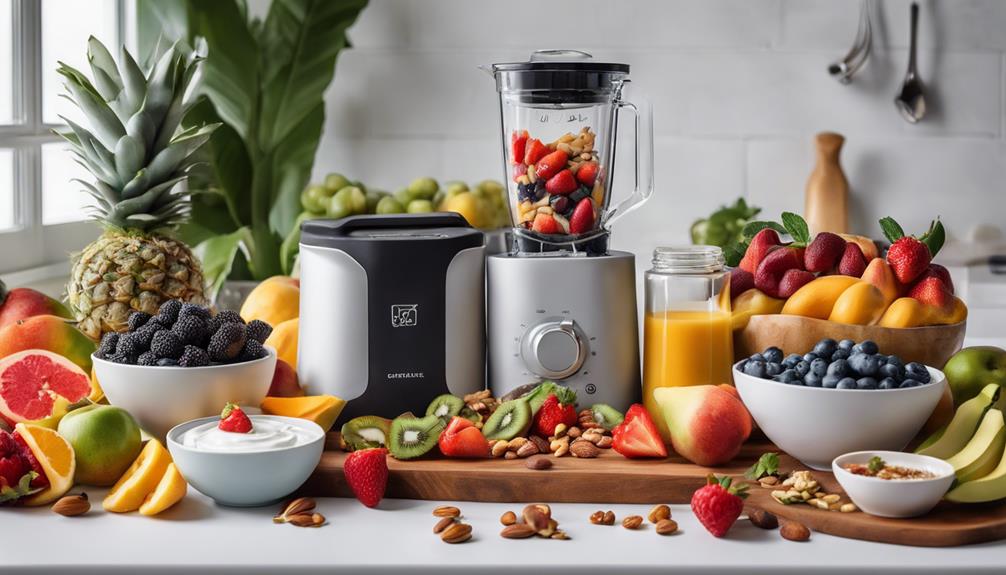Have you ever wondered if the rise of exotic combinations in frozen yogurt truly reflects a broader culinary sophistication? While traditional fruit flavors like strawberry and blueberry once dominated the scene, today’s frozen yogurt landscape is a playground for inventive tastes like lavender, matcha, and salted caramel. This shift isn’t just about flavor; it’s also about incorporating healthier ingredients, from natural sweeteners to probiotics and dairy-free alternatives. But what drives these changes, and how do they cater to modern consumer demands? Let’s explore this fascinating evolution further.
Key Takeaways
- Traditional fruit flavors like strawberry, blueberry, and peach have remained popular for their nostalgic and tangy profiles.
- There is a rise in exotic combinations incorporating flavors like lavender, matcha, and salted caramel, reflecting culinary sophistication.
- Healthier ingredient trends include natural sweeteners like honey and agave nectar, and the inclusion of probiotics for gut health benefits.
- Dairy-free innovations using plant-based alternatives such as coconut and almond milk address the growing demand for vegan and allergen-free options.
- Future trends show a move towards innovative flavors featuring exotic fruits, superfoods, and savory elements like sea salt caramel.
Traditional Fruit Flavors

When exploring traditional fruit flavors in frozen yogurt, you’ll find that classics like strawberry, blueberry, and peach have long been favorites due to their invigorating and tangy profiles. These timeless choices not only rejuvenate the palate but also evoke a sense of nostalgia, reminding many of summer days and homemade desserts. Strawberry, with its sweet yet slightly tart taste, has been a staple in the frozen yogurt industry, providing a vibrant color and a familiar flavor that appeals to diverse age groups.
Blueberry, another traditional favorite, offers a subtle sweetness and a unique, slightly earthy undertone that complements the creamy texture of frozen yogurt. Its appeal lies in its versatility, pairing well with other fruits and toppings. Similarly, peach brings a juicy, sun-ripened sweetness that balances perfectly with the coolness of frozen yogurt, offering a taste reminiscent of orchard-fresh produce.
While these flavors have stood the test of time, the introduction of mango has added a tropical twist to the traditional lineup. Mango’s rich, luscious flavor enhances the tangy base of frozen yogurt, creating a revitalizing and exotic option that maintains the essence of classic fruit flavors.
Rise of Exotic Combinations
As traditional fruit flavors continue to charm with their nostalgic allure, the rise of exotic combinations in frozen yogurt has introduced a wave of innovation and culinary sophistication, enchanting adventurous palates with flavors like lavender, matcha, and salted caramel. These unique flavors are not merely about novelty; they reflect a broader trend of integrating diverse culinary traditions into frozen yogurt recipes.
To cater to evolving consumer preferences, frozen yogurt shops now offer new toppings, such as superfoods and gluten-free options. They’re also expanding their menus to include vegan options and allergen-free alternatives, ensuring that everyone can indulge. This shift is driven by a growing demand for healthier alternatives without sacrificing taste or variety.
| Flavor | Topping | Dietary Option |
|---|---|---|
| Lavender | Goji Berries | Vegan |
| Matcha | Chia Seeds | Allergen-Free |
| Salted Caramel | Gluten-Free Brownie | Healthier Alternative |
| Mango-Turmeric | Coconut Flakes | Vegan |
Analyzing this trend, it’s clear that exotic combinations and new toppings aren’t just a fad. They’re an evolution in the frozen yogurt industry, meeting the demand for both indulgence and health-conscious choices. As you explore these unique flavors, you’re participating in a culinary revolution that’s as delicious as it is diverse.
Healthier Ingredient Trends

You’ll notice that healthier ingredient trends in frozen yogurt recipes are gaining traction, reflecting a shift towards natural sweeteners like honey and agave nectar. Historical data shows an increasing preference for probiotic-rich options, suggesting consumers are prioritizing gut health. Additionally, there’s a significant rise in plant-based milk alternatives, catering to both vegan diets and those with lactose intolerance.
Natural Sweeteners Rise
In the evolving landscape of frozen yogurt recipes, the shift towards natural sweeteners like honey, agave nectar, and stevia is driven by a growing consumer demand for healthier dessert options. Unlike refined sugars, these sweeteners offer nutritional benefits and lower glycemic indices, making them a popular choice among health-conscious consumers.
Honey, with its natural enzymes and antioxidants, is not only a healthier alternative but also adds a unique flavor profile to frozen yogurt. Agave nectar, sourced from the agave plant, provides a low-glycemic sweetening option, making it suitable for those managing blood sugar levels. Maple syrup, rich in minerals such as manganese and zinc, offers a robust, earthy sweetness that complements the creamy texture of frozen yogurt. Meanwhile, Stevia, a zero-calorie sweetener derived from the Stevia rebaudiana plant, caters to those seeking to reduce their calorie intake without sacrificing sweetness.
These shifts illustrate a broader trend towards incorporating natural ingredients to meet evolving dietary preferences. Below is a comparative table of these popular natural sweeteners:
| Sweetener | Source | Benefits |
|---|---|---|
| Honey | Bees | Antioxidants, enzymes |
| Agave Nectar | Agave Plant | Low glycemic index |
| Maple Syrup | Maple Trees | Rich in minerals, unique flavor |
| Stevia | Stevia Plant | Zero calories, natural |
| Monk Fruit | Monk Fruit Extract | Low glycemic, natural |
Probiotic Additions Increase
With the rise of health-conscious eating, the inclusion of probiotics in frozen yogurt has surged, enhancing its appeal as a gut-friendly dessert option. Over recent years, the demand for probiotic frozen yogurt has skyrocketed, largely due to its potential to aid digestion and promote gut health. Probiotics, such as Lactobacillus bulgaricus and Streptococcus thermophilus, are live cultures that can improve the balance of good bacteria in your digestive system.
This shift towards incorporating beneficial ingredients like probiotics into desserts reflects a broader trend in the food industry. Consumers are increasingly aware of the health benefits associated with probiotics, from improved digestion to enhanced immune function. As more people seek to integrate these health benefits into their diets, probiotic frozen yogurt stands out as an ideal choice that marries indulgence with wellness.
The inclusion of probiotics not only enhances the nutritional profile of frozen yogurt but also satisfies the modern consumer’s desire for functional foods. By choosing probiotic-rich frozen yogurt, you’re opting for a treat that doesn’t just taste good but also supports your gut health. This makes it a standout option in the evolving landscape of healthier desserts.
Plant-Based Milk Options
Plant-based milk options such as almond, coconut, and soy milk have revolutionized frozen yogurt recipes by providing lactose-intolerant individuals and those seeking dairy-free alternatives with healthier, lower-calorie choices that still deliver a creamy texture and rich flavor. Historically, frozen yogurt was made mostly with dairy milk, which posed challenges for those with lactose-intolerance and those looking for lighter, plant-based diets.
The shift towards plant-based milk options is part of a larger trend in the food industry emphasizing health and sustainability. These alternatives aren’t just about replacing dairy; they also offer unique benefits:
- Lower in Calories: Compared to traditional dairy milk, plant-based options typically have fewer calories, which is appealing for those watching their weight.
- Dairy-Free Options: Ideal for individuals with lactose-intolerance or allergies, plant-based milks make frozen yogurt more inclusive.
- Creamy Texture and Rich Flavor: Despite being dairy-free, these milks manage to maintain the creamy texture and rich flavor essential to high-quality frozen yogurt.
Analytically, the rise of plant-based milk options shows an increasing demand for healthier ingredients without sacrificing taste or texture. This evolution marks a significant milestone in the development of frozen yogurt recipes, catering to modern dietary needs and preferences.
Probiotics and Benefits
You might find it fascinating that frozen yogurt isn’t just a tasty treat; it’s also packed with probiotics like Lactobacillus bulgaricus and Streptococcus thermophilus that can greatly enhance gut health. Historically, probiotics have been used to aid digestion and boost the immune system. By incorporating these live cultures, frozen yogurt offers a dual benefit of satisfying your sweet tooth while promoting a healthier gut microbiota.
Gut Health Advantages
Frozen yogurt’s inclusion of probiotics like Lactobacillus bulgaricus and Streptococcus thermophilous provides significant advantages for gut health, including enhanced digestion and improved immunity. These live cultures are essential in promoting a balanced gut microbiota, which is vital for maintaining digestive health. By consuming frozen yogurt regularly, you’re supporting your body’s natural ability to break down food and absorb nutrients efficiently.
Historically, the health benefits of probiotics have been recognized for centuries, but it’s only recently that frozen yogurt has become a popular medium for these beneficial bacteria. The rise in health-conscious consumers has driven an increased interest in foods that offer more than just taste. Frozen yogurt, with its live cultures, fits perfectly into this trend, offering both a delicious treat and a health boost.
Here are three key benefits of incorporating frozen yogurt into your diet:
- Enhanced Digestion: Probiotics help break down complex food molecules, making digestion smoother.
- Improved Immunity: A healthy gut microbiota can fend off harmful pathogens.
- Gut Health: Regular consumption of probiotics supports a balanced and diverse gut ecosystem.
Understanding these benefits, you can see why frozen yogurt has become a staple for those prioritizing gut health.
Immune System Boost
Over recent decades, research has increasingly highlighted the role of probiotics in not only promoting gut health but also in significantly boosting the immune system. Frozen yogurt, rich in these beneficial bacteria, has become a favored choice for those looking to enhance their immune response. Probiotics in frozen yogurt help balance gut flora, an essential aspect of maintaining a robust immune system.
Scientific studies show that these live bacteria can stimulate the body’s production of natural antibodies, thereby improving immune response. Regular consumption of frozen yogurt with probiotics can reduce the risk of infections, supporting overall immune function.
| Probiotics Benefit | Impact on Immune System |
|---|---|
| Enhances gut health | Stronger immune response |
| Balances gut flora | Improved antibody production |
| Reduces infection risk | Boosts overall immunity |
| Supports natural defenses | Enhanced immune function |
| Promotes digestive health | Indirectly supports immunity |
Historically, the relationship between gut health and the immune system wasn’t well understood. Today, it is evident that a well-balanced gut flora is integral to a strong immune system. By incorporating frozen yogurt into your diet, you’re not just enjoying a tasty treat; you’re also making a scientifically-backed choice to bolster your health.
Dairy-Free Innovations

With the surge in dairy allergies and the rise of vegan diets, dairy-free innovations in frozen yogurt have transformed the market by incorporating plant-based alternatives like coconut, almond, and cashew milk, delivering rich flavor and creamy texture to an ever-growing consumer base. Gone are the days when non-dairy options were limited and lackluster. Today, these alternatives offer a satisfying experience comparable to traditional dairy.
Dairy-free frozen yogurt made with coconut milk provides a creamy, tropical twist, while almond milk offers a lighter, nutty flavor. Cashew milk, known for its smooth texture, is another excellent base, making it easier to achieve that classic frozen yogurt consistency. These plant-based options are often sweetened with natural sweeteners like agave nectar or maple syrup, which cater to health-conscious consumers.
Historically, the demand for dairy-free options skyrocketed alongside the growth of vegan diets and awareness of dairy allergies. This led to the rapid expansion of the market, driven by the need for inclusive, tasty alternatives.
Here are three key points to understand this evolution:
- Plant-based Milks: Coconut, almond, and cashew milk are the primary bases.
- Natural Sweeteners: Agave nectar and maple syrup enhance flavor without artificial additives.
- Market Growth: Driven by dietary restrictions and lifestyle choices.
These innovations make it possible for everyone to enjoy frozen yogurt, regardless of dietary needs.
Future Flavor Trends
As the frozen yogurt market evolves, expect to see an array of innovative flavor trends that blend exotic ingredients, superfoods, and even savory elements, transforming your dessert experience into an adventurous culinary journey. Unique combinations such as matcha green tea with black sesame or lavender honey will likely captivate your taste buds with their nuanced, sophisticated profiles. Exotic fruit flavors like dragon fruit, lychee, and passionfruit are poised to bring a tropical flair, offering a rejuvenating departure from conventional choices.
Savory flavors are also making waves, with intriguing options like sea salt caramel, balsamic strawberry, and sweet corn providing a delightful contrast to the traditionally sweet frozen yogurt. Superfood-infused flavors are set to appeal to health-conscious consumers. Imagine enjoying a nutrient-packed dessert with flavors like açaí berry, spirulina, or turmeric, which not only taste great but also offer added health benefits.
Lastly, dessert-inspired flavors such as tiramisu, red velvet cake, and key lime pie will allow you to indulge in the decadence of your favorite sweets without the guilt. These future flavor trends promise to elevate your frozen yogurt experience to unprecedented levels of creativity and enjoyment.
Frequently Asked Questions
What Is the History of Frozen Yogurt?
You’ll find frozen yogurt’s history fascinating. It began in the 1970s as an ice cream alternative, leveraging yogurt cultures for probiotic benefits. Health trends and flavor variety propelled its dessert innovation, making it a lasting favorite.
Do You Just Freeze Yogurt to Make Frozen Yogurt?
You can’t just freeze yogurt and expect perfect frozen yogurt. For texture improvement, blend in sweeteners, flavor combinations, and consider dairy alternatives. Homemade versions also benefit from probiotic benefits, ensuring a creamy, delicious treat.
Who Was the First Person to Make Frozen Yogurt?
H.P. Hood was the first person to make frozen yogurt, blending yogurt origins with early production techniques. This culinary pioneer’s first recipe and historical documentation reveal a significant cultural influence on dessert trends.
What Happened to Elan Frozen Yogurt Brigham?
Elan Frozen Yogurt Brigham, founded by innovative entrepreneurs, faced business challenges and market competition, leading to closures. The brand’s evolution couldn’t overcome changing consumer preferences, illustrating the difficulties in maintaining product innovation in a saturated market.
Conclusion
You’ve journeyed through the evolution of frozen yogurt, from traditional fruit flavors to innovative exotic combinations. As you’ve seen, the integration of healthier ingredients, probiotics, and dairy-free alternatives has redefined this beloved treat. But what’s next on the horizon? Stay tuned, because the future promises even more surprising and adventurous flavors that could revolutionize your palate. The world of frozen yogurt is ever-evolving, and you won’t want to miss what’s coming next.







